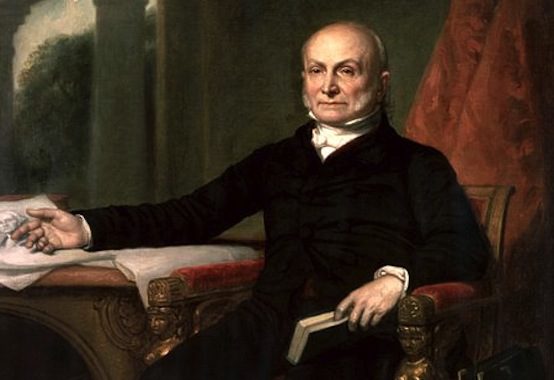What Joe Biden Can Learn From John Quincy Adams

On July 4, 1821, Secretary of State John Quincy Adams stood before the U.S. House of Representatives to give an Independence Day address. He’d been invited simply to recite the Declaration of Independence, but in time was afforded the opportunity to give some additional remarks.
He mulled over the offer and eventually decided to use his platform to discuss America’s place in the world. Adams said of the young nation, “She goes not abroad in search of monsters to destroy. She is the well-wisher to the freedom and independence of all. She is the champion and vindicator only of her own.”
How things have changed. Now, whether the president has an R or a D next to his name, he participates in endless wars, bombs far-off lands—looks for monsters to destroy. That approach has for far too long caused a world of hurt for U.S. troops and foreign civilians.
One would hope that a new presidential administration would bring change to the status quo. President Joe Biden’s cabinet picks have been remarkable for how unremarkable they are—a welcome change from the Trump years. But Biden would be far better served by a cabinet committed to the restraint that Adams spoke of and that has so long been absent from U.S. foreign policy.
As Adams eloquently said, the United States ought to champion only its own independence, though the incoming Biden administration maintains little of that old worldview. The president recently wrote a piece for Foreign Policy expressing his belief that the U.S. should be “prepared to lead again” and should return to “the head of the table.” Biden’s pick for secretary of state, Antony Blinken, sang a similar tune in an interview with The New York Times: “Whether we like it or not, the world simply does not organize itself,” he said.
Tellingly, both men have openly warned against an international order without the U.S. as a dominant presence. Were that to happen, they say, either a more malevolent nation would take its place or nothing would—both undesirable options. Therefore, they reason, the U.S. must make use of its unique moral standing to guide the international agenda and stand in direct opposition to rogue states.
That argument’s undercurrent should sound familiar. Trump may have been the “America First” president, but Biden is set to pursue his own brand of the doctrine—one that looks less egocentric at face value but that nonetheless puts the U.S. front and center as the moral defender of the international community. It’s an approach underlined by good intentions, but it ultimately serves to blind our foreign policy decision-makers.
Good intentions don’t equal good results, least of all in foreign policy. Our self-imposed mandate to lead has tied us to never-ending and morally questionable campaigns abroad, whether they be in Iraq, Afghanistan, or even our seemingly remote conduct in Yemen. Just shy of 80 million Americans—a quarter of the population—have never lived in a United States at peace. We’ve dropped bombs on 24 countries since World War II. Our actions abroad have radicalized terrorist organizations and heightened anti-American sentiment. Our quest to destroy monsters abroad often creates more of them.
Adams, in his July 4 address, predicted the danger of such conduct: “She might become the dictatress of the world; she would be no longer the ruler of her own spirit.” Today, our reputation suffers and our image as an international guardian degrades our spirit.
Adams’ address hardly came at a peaceful time. The War of 1812 was still freshly branded on the national memory. Across the country, American troops had just fought the British in a war for their “second independence.” Cities were destroyed; 15,000 Americans had died. Yet Adams could recognize the danger of unnecessary foreign entanglements. Faced with an international community that was often hostile towards the U.S., Adams committed himself to restraint and urged the young country to do the same.
Biden, who holds that “America must lead again,” must recognize that such leadership can be costly—both monetarily and in terms of reputation. He hopes to reinvent NATO, for instance, but scholars are divided on whether the expensive alliance is truly worth American involvement now that the Cold War is a distant memory. And arguably, the moral imperative to “do something” is part of what has landed the U.S. in its never-ending wars abroad (and has kept us involved).
Biden speaks of “the strength and audacity that took us to victory in two world wars and brought down the Iron Curtain,” but fails to link our flailing international reputation to that same strength and audacity. By no means are these qualities cure-alls. Instead, Biden would be far better off pursuing a foreign policy that is distant yet friendly. The U.S. should not be the grand dictateur of worldwide morality and order, but it should be open to the goodwill of other nations.
Our foreign policy has never been guided by angels, and the Biden administration will be no different. Optimism is comforting, but it’s more important to be humble, measured, and realistic. None of this is to say that full withdrawal from international institutions would be to our benefit—simply that it isn’t imperative for the U.S. to be at the head of every table.
To Adams, the supreme moral leadership of the U.S. rested on its commitment to humility, integrity, and self-improvement. By that virtue, we must forever be aware of our own limitations. What we could use now is a kinder, gentler nation, not one that needs to be front and center in all of the world’s fights.
Fiona Harrigan is an Openness Fellow for Young Voices and a research assistant for the American Institute for Economic Research. Find her on Twitter @Fiona_Harrigan.